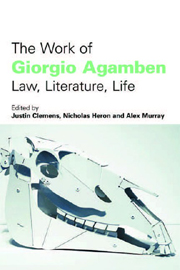Book contents
- Frontmatter
- Contents
- Acknowledgements
- Notes on Contributors
- The Enigma of Giorgio Agamben
- 1 K
- 2 Integral Actuality: On Giorgio Agamben's Idea of Prose
- 3 The Role of the Shifter and the Problem of Reference in Giorgio Agamben
- 4 ‘Its Silent Working was a Delusion’
- 5 Politics and Poetics of Divine Violence: On a Figure in Giorgio Agamben and Walter Benjamin
- 6 Idea of Poetry, Idea of Prose
- 7 The Fading Memory of Homo non Sacer
- 8 Soulblind, or On Profanation
- 9 Face to Face with Agamben; or, the Other in Love
- 10 Beyond Spectacle and the Image: the Poetics of Guy Debord and Agamben
- 11 Dismantling Theatricality: Aesthetics of Bare Life
- 12 Notes on Media and Biopolitics: ‘Notes on Gesture’
- Index
2 - Integral Actuality: On Giorgio Agamben's Idea of Prose
Published online by Cambridge University Press: 12 September 2012
- Frontmatter
- Contents
- Acknowledgements
- Notes on Contributors
- The Enigma of Giorgio Agamben
- 1 K
- 2 Integral Actuality: On Giorgio Agamben's Idea of Prose
- 3 The Role of the Shifter and the Problem of Reference in Giorgio Agamben
- 4 ‘Its Silent Working was a Delusion’
- 5 Politics and Poetics of Divine Violence: On a Figure in Giorgio Agamben and Walter Benjamin
- 6 Idea of Poetry, Idea of Prose
- 7 The Fading Memory of Homo non Sacer
- 8 Soulblind, or On Profanation
- 9 Face to Face with Agamben; or, the Other in Love
- 10 Beyond Spectacle and the Image: the Poetics of Guy Debord and Agamben
- 11 Dismantling Theatricality: Aesthetics of Bare Life
- 12 Notes on Media and Biopolitics: ‘Notes on Gesture’
- Index
Summary
If only by the discontinuous or elliptical character of its prose, Giorgio Agamben's Idea of Prose revives the question of the relationship between philosophy and poetry. Is the constellation of ideas that it forms the product of a poetic vocation or of a thought that seeks to liberate truth from its linguistic reification? This question, the question of the relationship between philosophy and poetry, between meaning and melos, between a prose whose implicit philosophical determination regulates the effects of its signifying function and a poetry whose purely sonorous and rhythmic dimension seems to resist any translation – this question is also explicitly raised in the fragment or aphorism that bears the same title as the book itself, ‘Idea of Prose’.
Agamben does not want to keep meaning apart from poetic sound and rhythm. Rather, for him, the question of the relationship between philosophy and poetry becomes the question of a language or a prose that no longer lets itself be determined by the difference inscribed in this relationship: ‘Neither poetry nor prose but – il loro medio.’ How are we to translate ‘medio’, the word with which the aphorism or fragment entitled ‘Idea of Prose’ closes? If there is an idea of language or an idea of prose that leads beyond the opposition between signifi- cation and sonorous rhythm, between content and form, between the syntactical and the metrical, then these terms are all divided by what they share: ‘il loro medio’.
- Type
- Chapter
- Information
- The Work of Giorgio AgambenLaw Literature Life, pp. 28 - 42Publisher: Edinburgh University PressPrint publication year: 2008



